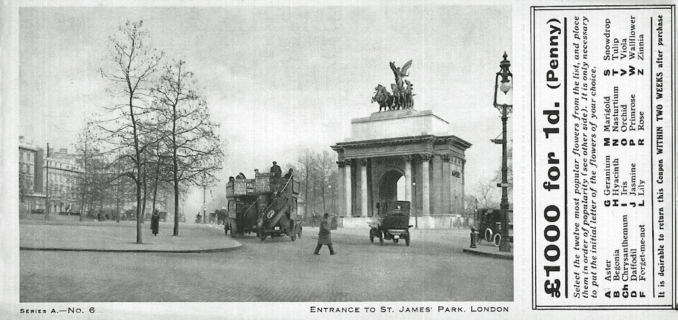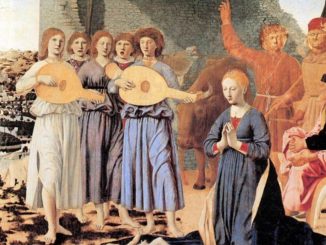
Entrance to St James Park, London,
Leonard Bentley – Licence CC BY-SA 2.0
If you think I can remember 1924, you’re wrong. One relies upon our friends at the British Newspaper Archive. Ten decades ago some newspapers did publish on Christmas Day. The Sutton & Epsom Advertiser was packed with adverts – including one for a ‘bargain’ £900 house – and led with Mr Granville Bantock and Mr Plunket Greene adjudicating in a Saskatchewan music festival. Am I the only Puffin who suspects this was pasted up and printed well before Xmas to give just about everybody at Sutton & Epsom House a day off while still having something to sell?
In Fleet Street the Daily Mirror published on Christmas Eve and then awarded itself two days off. In those times, Robert Maxwell’s future organ was subtitled ‘The Daily Picture’ and claimed to be the ‘paper with the largest sale.’ Next to the title spread, a boxed eyecatcher proclaimed, ‘Duke of York Crosses The Line.’ An astonishing century-old alignment of the headlines but, as we shall discover, not a reference to nefarious goings-on with an inscrutable Fu Manchu moustachioed spy despatched from the Forbidden City by Emporer Pu Yi of the Qing dynasty.
The Mirror’s pictures at the top of the front page show the ‘bright badges of yuletide festivity.’ Two nurses decorate a ward in ivy, holly and mistletoe at the Queen Mary’s Hospital in Carshalton. Next to them, Attorney General Sir Douglas Hogg with his son Neil are pictured at their home in Hailsham. Decorations are lifted above a grand fireplace with an ornate fireguard afore a suspissiously empty hearth. And they expect us to believe the world used to be colder!
In an echo of the Duke of York’s timeless omnipresence, the Attorney General’s son, Quintin Hogg, was to be the High Lord Chancellor of Great Britain and his son, another Douglas Hogg, became a Conservative MP. This is the Douglas Hogg who claimed for moat cleaning during the expenses scandal. After standing down in disgrace at the 2010 general election, he became a life peer in 2015. In doing so, he took the peerage given up by Quintin Hogg when he entered th House of Commons. Some things never change, and it they do, they soon change back again.
Beneath the pictures of festivities, the Mirror gets back down to tabloid business with a report of a doctor’s death in a lorry crash and a tale of rural villainy. Daisy Idina Purser is pictured leaving court in West Malling after being committed for trial for attempting to murder Mr and Mrs Robert Sedgwick. Mr Sedgwick was a farmer of Offam and a local councillor. Gracious. The quiet ones always the worst, Miss Purser presents bespectacled, demure, tight-lipped and with a full fox pelt (or is it a racoon?) around her neck.
Further proof that human nature doesn’t change much is revealed in the inside pages. The Rev PTR Kirk’s public school research showed nineteen boys out of a class of 42 owned up to backing horses. Their average age (the boys, one assumes, not the horses) was eleven and a quarter. Caught out when asked to write an essay on what they did on Saturdays, one boy penned the first thing he did was ‘make up his book’ while acting as a bookmaker for the other pupils.
Puffins familiar with the Senior Service will be pleased to hear evidence of three of our submarines being at sea at the same time. Unfortunately, this comes from a court martial where Lieutenant-Commander John Musters was reprimanded for managing to ground two of his flotilla on the Brambles Shelf.
As for the line crossed by the Duke of York, MI5 will be relieved it refers to the Equator being traversed by the Duke and Duchess on their voyage to the East African port of Mombassa. Dressed in a vest and shorts, the Duke, as is the tradition, was ragged, rough shaved and ducked by Father Neptune. The Duchess had to swallow a mystery pill. Later, a raid on the bridge saw Captain Steadman receive the same treatment.
Closer to home, Callender Hydro, a splendid building in the romantic district of the Trossachs, burnt out in a fire. The Falkirk brigade when racing to the conflagration, crashed into a wall injuring the firemaster and five of his men. Also on the move, George Bernard Shaw and his wife were to take a sunbathing break to Maderia upon the advice of Sir Herbert Barker. A Mr J T Roberts, a retired bank manager of Menai Bridge, took ill and died while waiting as a juryman at an inquest.
Remaining with banking, a Walter Schwendeller (is it pronounced ‘swindler’?) of the Swiss Bank Corporation faced prosecution at the Guildhall. The young man had been betting enormously, beginning with small amounts and progressing to preposterously huge sums. He enjoyed considerable success but, on the other hand, he wasn’t wagering his own money. Schwendeller the swindler stood charged with speculating expensively on the stock exchange after stealing a total of £5,900 from Messrs J Henry Schroder and Co, bankers of Leadenhall Street.
Is there a Puffin who worked for a Swiss bank? Keep an eye on him!
As now, England were touring. The difference a century ago being, instead of losing to New Zealand, they trailed Australia by 410 runs with the Aussies in their second innings and with five wickets in hand.
Back to the Duke of York. By tradition a title held by the monarch’s second son, the then Duke was Albert Frederick Arthur George, the second son of King George V. Known to his family as “Bertie,” we remember him as King George VI, who ascended to the throne in 1936 following the abdication of his older brother. Bertie married lady Elizabeth Bowes-Lyon (who we recall as the Queen Mother) in April 1923, with their crossing of the Equator at Christmas of the next year being part of a tour of Kenya, Uganda and the Sudan. In those days, all appeared a reassuring Empire crimson on the world map.
If readers were feeling luckier than the Falkirk fire brigade or the unfortunate Mr J T Roberts, they might invest in the St Paul’s Hospital penny postcard competition (see top of article). A purchase could win a first prize of £1,000 by naming the twelve most popular flowers in order of popularity from a list of twenty. According to Mr Leonard Bentley, a modern day collector of such cards, the competition ran for two months in November and December 1924. A good cause closer to the lower torso than to the heart, St Paul’s specialised in the treatment of venereal diseases.
And on that cheery note, Merry Christmas everybody!
© Always Worth Saying 2024



